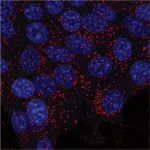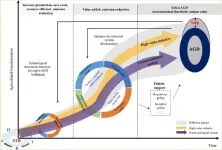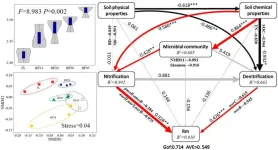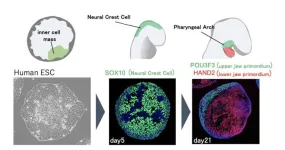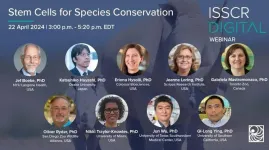(Press-News.org) Softer tumours fuel more aggressive spread of triple-negative breast cancer
Researchers have discovered how the mechanical properties of tumours can prime cancer cells to better survive their spread to other organs.
A metabolic ‘survival switch’ controlled by the stiffness of triple-negative breast tumours can significantly influence how successfully their cancerous cells spread to other organs, according to new findings from the Garvan Institute of Medical Research.
The study in cell and mouse models showed that softer tumour environments, typical of early-stage cancer, can prime triple-negative breast cancer cells to use an extra energy source for survival during metastasis. The research suggests that drugs targeting this altered cancer cell metabolism could boost treatments for metastatic triple-negative breast cancer.
“Our research suggests triple-negative breast cancer cells in soft tissue environments are ‘primed’ to better survive the spread to other organs and that they switch on an alternative form of metabolism to do so,” says Associate Professor Cox, Head of the Matrix & Metastasis Lab at Garvan and senior author of the study published in Advanced Science.
“This suggests that triple-negative breast cancer cells spreading from softer tumours are more aggressive, and drugs that target cancer cell metabolism may benefit patients with metastatic triple-negative breast cancer treatment.”
A metabolic survival advantage
Triple-negative breast cancers are highly aggressive and difficult to treat as they lack three receptors (for oestrogen, progesterone and the HER2 protein) that can be targeted in other breast cancers. New treatment options are urgently needed for the 2,500 women diagnosed every year in Australia alone.
Using biomaterials that mimic the properties of tumours, the team investigated how triple-negative breast cancer cells respond to the physical stiffness of their environment. The researchers found the cancer cells were primed to be more resilient when grown in soft environments and, when injected into mouse models, up to 11.8 times more likely to metastasise to new sites compared to those from rigid tumour environments.
The team also discovered that soft environments altered the cancer cells’ preference for ‘fuel’ in a way that enhanced their durability while travelling through the body. These primed cells metabolised glucose – the preferred energy source for cancer cells – but they also stockpiled lipids as internal fuel reserves and in turn ramp up lipid metabolism – a more resilient energy pathway for their journey from a primary tumour site.
“This switch to using both glucose and fats as an energy source equips cells to better survive the mechanical stresses of travelling through the blood stream and seeding new tumour sites throughout the body,” says first author Dr Elysse Filipe, who completed the study as a postdoctoral researcher at Garvan. “By blocking lipid metabolism in triple-negative breast cancer cells, we were able to ‘starve’ their high energy demand and reduce metastasis in a cell model.”
A new approach for triple-negative breast cancer
“Our findings highlight that the physical properties of triple-negative breast cancers, which vary dynamically as the cancer progresses, profoundly impact the cancer’s ability to spread,” says Dr Filipe. “These findings reveal a vulnerability of triple-negative breast cancers – the metastasising cells’ reliance on diverse fuel sources to meet their high energy demands.”
Associate Professor Cox adds: “The study underscores the importance of considering the mechanical diversity within and between tumours when designing new treatments for aggressive cancers. We now plan to explore whether pairing targeted metabolic inhibitors with existing therapies could limit metastasis and improve outcomes for triple-negative breast cancer patients.”
--ENDS--
This research was supported by Australia’s National Health and Medical Research Council, Cancer Council NSW and an Australian Government Research Training Program Scholarship.
Associate Professor Cox is a Conjoint Associate Professor at St Vincent's Clinical School, Faculty of Medicine and Health, UNSW Sydney.
END
Softer tumours fuel more aggressive spread of triple-negative breast cancer
Researchers have discovered how the mechanical properties of tumours can prime cancer cells to better survive their spread to other organs.
2024-04-12
ELSE PRESS RELEASES FROM THIS DATE:
Dynamic-EC: An efficient dynamic erasure coding method for permissioned blockchain systems
2024-04-12
It's interesting to hear about the research led by Minyi Guo that was published in Frontiers of Computer Science on 12 Mar 2024. It seems like they are addressing the challenge of reducing storage overhead in blockchain systems while maintaining data consistency and tolerating malicious nodes.
In traditional blockchain networks, full replication is used, where each node stores a complete copy of all blocks, and data consistency is maintained through a consensus protocol. However, this approach can be storage-intensive, especially as the blockchain grows over time.
To address ...
How does the STB promote the coordination between environmental protection and agricultural development in Erhai Lake?
2024-04-12
Erhai Lake, covering 252 km2, located in Yunnan Province, is one of the seven largest freshwater lakes in China. However, over the last three decades, the lake has suffered pollution episodes. In order to solve this problem, the local government has taken many protective measures. These measures have achieved some results in the environmental protection of Erhai Lake, but also caused significant socioeconomic impact. The tension between environmental preservation and economic stability in Erhai has even been termed the ‘Erhai dilemma’. The ‘Erhai dilemma’ is representative of those of other lakes in Yunnan Province ...
New study uncovers the role of soil microbes in forest ecosystems
2024-04-12
Assessing the function of forest ecosystems requires a deep understanding of the mechanisms of soil nitrogen mineralization. A recent study conducted by a team of researchers has shed light on how soil N-cycling genes drive soil nitrogen mineralization during afforestation. The findings, published in the prestigious journal Soil Ecology Letters, provide valuable insights into the relationship between soil microbial communities, functional genes, and the rate of soil nitrogen mineralization.
The researchers collected soil samples from a chronosequence of Robinia pseudoacacia L (RP14, RP20, RP30, and RP45) at different stages of afforestation, along with a sloped farmland (FL) as ...
Cells putting on a face
2024-04-12
Kyoto, Japan -- Mother Nature is an artist, but her craft of creating animal faces requires more than a paintbrush and palette. Such highly complex shapes originate from their respective transient neural crest cells.
These embryonic pluripotent cells within the facial primordium—the early development form—may be necessary for forming proper facial structures. However, analyzing the molecular mechanisms in such early stages of development poses many technical challenges.
Now, a group of Kyoto University researchers have produced neural crest cell-rich ...
First clinical trial of vosoritide for children with hypochondroplasia shows increased growth
2024-04-12
WASHINGTON (April 11, 2024) – Vosoritide’s first global phase 2 study showed an average increased growth rate of 1.8 cm per year in children with hypochondroplasia, a genetic cause of short stature in children, according to researchers from Children’s National Hospital.
“This is the first medicine that has been developed to specifically target the pathway involved in hypochondroplasia,” says Andrew Dauber, M.D., chief of Endocrinology at Children’s National. “These findings will help inform future studies of vosoritide for addressing growth disorders.”
This clinical trial ...
Two key brain systems are central to psychosis, Stanford Medicine-led study finds
2024-04-12
Inside the brains of people with psychosis, two key systems are malfunctioning: a "filter" that directs attention toward important external events and internal thoughts, and a "predictor" composed of pathways that anticipate rewards.
Dysfunction of these systems makes it difficult to know what’s real, manifesting as hallucinations and delusions.
The findings come from a Stanford Medicine-led study, publishing April 11 in Molecular Psychiatry, that used brain scan data from children, teens and young adults with psychosis. The results confirm ...
Rice’s Megan Reiter wins NSF CAREER Award to investigate planet-forming environments
2024-04-12
Megan Reiter, an assistant professor of physics and astronomy at Rice University, has won a National Science Foundation (NSF) CAREER Award to investigate the influence of neighboring stars on the formation of planets.
The research funded by Reiter’s five-year, $951,446 NSF grant will shed light on a phenomenon that could significantly impact our understanding of how planets are born.
“By exploring the intricate interplay between stars, planets and their environments, we hope to clarify the key forces that shape planet formation,” Reiter said.
Observations show planets form in the ...
ISSCR hosts free Earth Day webinar “Stem Cells for Species Conservation”
2024-04-12
Join the International Society of Stem Cell Research (ISSCR) to celebrate Earth Day on 22 April 2024 by diving into the science of conservation, where the potential of stem cells is harnessed to foster a more sustainable and biodiverse future. This enlightening webinar co-hosted by Ashlee Hutchinson and Jun Wu will spotlight the revolutionary intersection of induced pluripotent stem cells (iPSCs), embryo models and genome engineering technologies with the noble cause of species preservation.
As our planet faces unprecedented biodiversity loss, this program will unveil how cutting-edge scientific advancements offer a lifeline for endangered species, ...
University of Oklahoma engineer receives $3.1M grant for clean hydrogen technologies
2024-04-12
NORMAN, OKLA. – Hanping Ding, Ph.D., an assistant professor in the School of Aerospace and Mechanical Engineering at the University of Oklahoma, has been awarded a $3.1 million grant from the Hydrogen and Fuel Cell Technologies Office in the Department of Energy through the Bipartisan Infrastructure Law to further research in clean hydrogen production. The funding is part of a $750 million effort in President Biden’s Investing in American agenda. The money from the Department of Energy will go to 52 projects across 24 states to position the United States as a global leader in the clean hydrogen industry.
The combined outcomes of the 52 projects should allow the ...
Prestigious European grant for research into biodegradable plastics
2024-04-12
Professor dr. Linda Amaral-Zettler, Research Leader at NIOZ Royal Netherlands Institute of Sea Research and the Chair in Marine Microbiology at the University of Amsterdam has been awarded a prestigious Advanced ERC-grant by the European Commission today. Amaral-Zettler receives almost 3,5 million euros for her research into biodegradation in the marine environment. “Biodegradable sounds really nice”, she admits. “But before we repeat the mistakes we’ve made with fossil-fuel-based plastics back in the last millenium, we really want to understand how these materials interact with marine life and how long they last in the environment.” “Biodegradable ...
LAST 30 PRESS RELEASES:
Reconstructing the world’s ant diversity in 3D
UMD entomologist helps bring the world’s ant diversity to life in 3D imagery
ESA’s Mars orbiters watch solar superstorm hit the Red Planet
The secret lives of catalysts: How microscopic networks power reactions
Molecular ‘catapult’ fires electrons at the limits of physics
Researcher finds evidence supporting sucrose can help manage painful procedures in infants
New study identifies key factors supporting indigenous well-being
Bureaucracy Index 2026: Business sector hit hardest
ECMWF’s portable global forecasting model OpenIFS now available for all
Yale study challenges notion that aging means decline, finds many older adults improve over time
Korean researchers enable early detection of brain disorders with a single drop of saliva!
Swipe right, but safer
Duke-NUS scientists identify more effective way to detect poultry viruses in live markets
Low-intensity treadmill exercise preconditioning mitigates post-stroke injury in mouse models
How moss helped solve a grave-robbing mystery
How much sleep do teens get? Six-seven hours.
Patients regain weight rapidly after stopping weight loss drugs – but still keep off a quarter of weight lost
GLP-1 diabetes drugs linked to reduced risk of addiction and substance-related death
Councils face industry legal threats for campaigns warning against wood burning stoves
GLP-1 medications get at the heart of addiction: study
Global trauma study highlights shared learning as interest in whole blood resurges
Almost a third of Gen Z men agree a wife should obey her husband
Trapping light on thermal photodetectors shatters speed records
New review highlights the future of tubular solid oxide fuel cells for clean energy systems
Pig farm ammonia pollution may indirectly accelerate climate warming, new study finds
Modified biochar helps compost retain nitrogen and build richer soil organic matter
First gene regulation clinical trials for epilepsy show promising results
Life-changing drug identified for children with rare epilepsy
Husker researchers collaborate to explore fear of spiders
Mayo Clinic researchers discover hidden brain map that may improve epilepsy care
[Press-News.org] Softer tumours fuel more aggressive spread of triple-negative breast cancerResearchers have discovered how the mechanical properties of tumours can prime cancer cells to better survive their spread to other organs.
